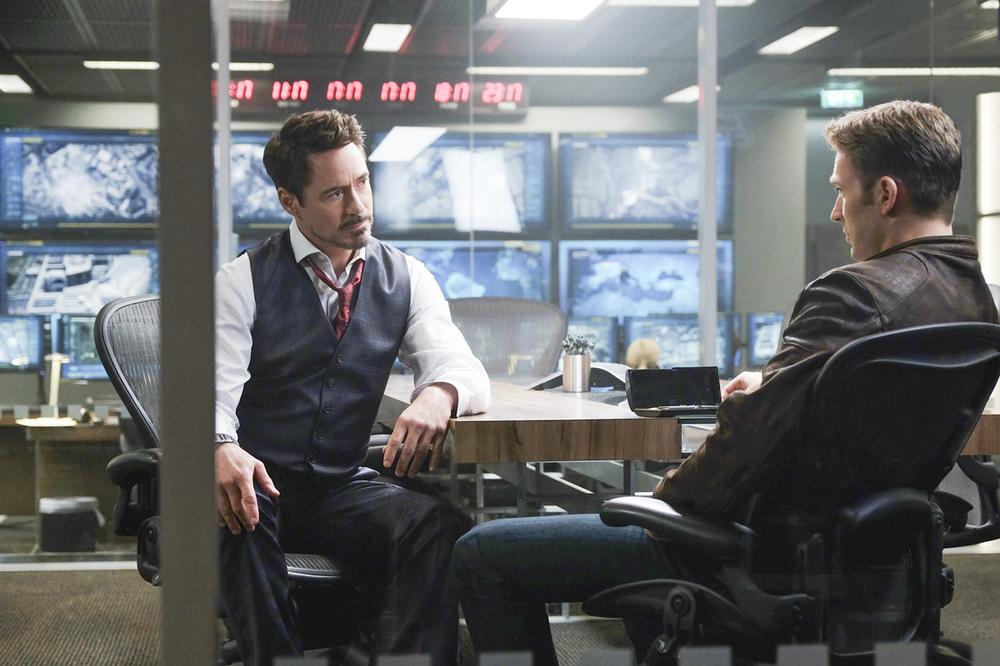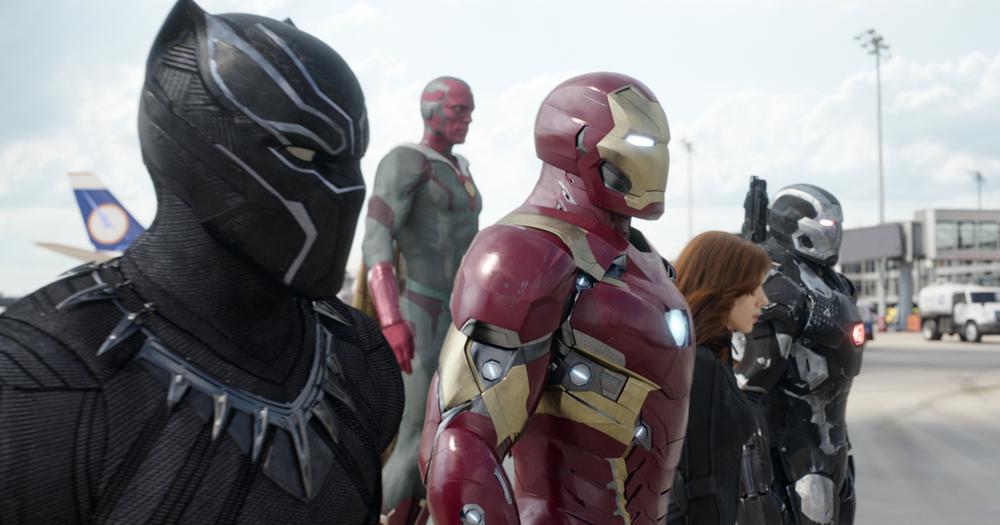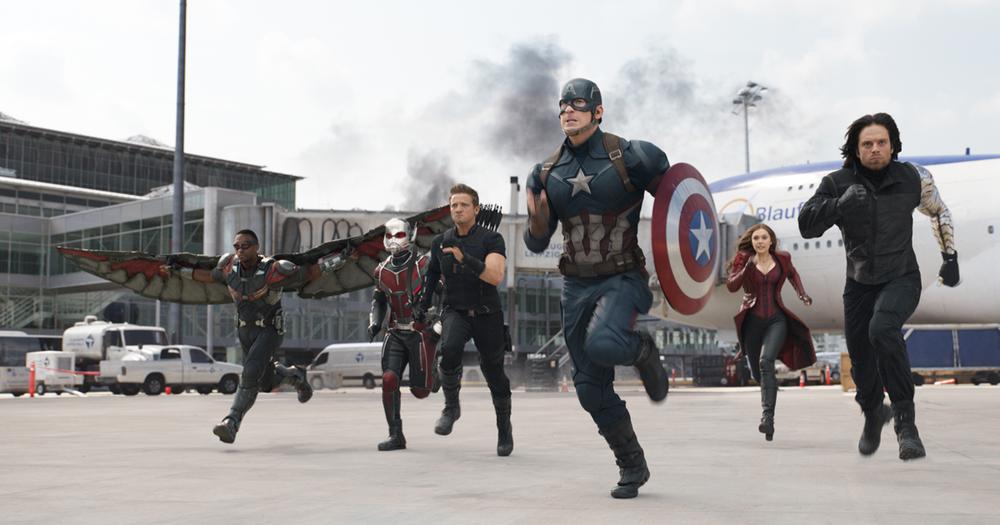
Popular culture is one of my favorite cogitation points because it really gives us a chance to look at the cycle of representation and commentary. Viewing Captain America: Civil War through a lens of American political theory gave me a new perspective on modern American political idealism. When I sat down to research this particular article, I came into it with the hypothesis that the movie focused on the American ideals of federalism. As I read the Federalist Papers, I was reminded that the Federalists believed in a strong central government and that they aligned quite strongly with my Hobbesian view of the social need for government.
What then, I began to question myself, does that say about Cap? And if Cap ultimately represents what we see as pure in American ideology, what does that say about our current system of government? Further, and perhaps most importantly, what does all of this mean in the context of changing satisfaction or not with our society today?
Totes deep. INORITE? This is why I don’t sleep at night.
Here’s the thing though. Wading through the writings of the Founding Fathers, I started to think that maybe what we’re seeing in our current social narratives means that we are experiencing a shift. We are distancing ourselves from the founding beliefs upon which American society has rested since its inception. In terms of the fundamental goals of how government should function, perhaps we no longer believe in the federalism we thought we did. If we look to the Anti-Federalist movement during the immediate post-Revolutionary period, we can see that many of our current discussions regarding the diversity of our large nation are still relevant. A more loosely held confederation, similar to the European Union model, compared to the federalized form of national government we have here currently is possibly the conversation we need to have and the one that Civil War promotes.

Civil War’s narrative place in the MCU creates this new focus. First of all, unlike the comic event, it was specific to the Captain America series. In doing so, Marvel fostered an automatic binary of good-bad. Had we seen it in the Iron Man franchise, the outcome would have been narratively different. By positioning Cap’s perspective as the hero-line, his philosophy becomes the de facto “right side.” This means that we see a philosophical bias.
Before we were the United States of America, we were a confederation of states. Unsurprisingly, that didn’t work out so well. If you want a quick discussion of why – go find “Cabinet Battle #1” from Hamilton: The Musical. After the Revolution, different states had different needs. The South was recovering well with its continued slavery (although a lot of northern states also had slaves). Northern states were trying to recover from the devastation of the war. Vermont didn’t even exist yet and were pretty peeved at not being independent from New York. New York was having a ton of problems arising out of the prosecution of residents who had been loyalists during the war. As the infighting increased, the hold of the states on their freedom decreased.
How then, do Iron Man and Cap fit into this sordid mess of American history?
I’m so glad you asked. It’s not at all a thing I’ve been rolling around in my head. Nope. (Note: It totally has been.)
Captain America: Civil War begins with a focus on the Sokovia Accords. As the Avengers split into two groups, Iron Man and his cronies focus on granting the Accords validity in order to remain a unified front and gain popular trust. Cap and his cohorts determine that sacrificing their freedom to the government allows for errors that overshadow the purpose of their ability to protect the people who most need them.

In essence, Iron Man and his team represent the Federalist belief that a strong central government is essential to aggregating the trust and the will of the people. In Federalist Paper #10, often considered one of the most iconic, Madison wrote
The latent causes of faction are thus sown in the nature of man; and we see them everywhere brought into different degrees of activity, according to the different circumstances of civil society. A zeal for different opinions concerning religion, concerning government, and many other points, as well of speculation as of practice; an attachment to different leaders ambitiously contending for pre-eminence and power; or to persons of other descriptions whose fortunes have been interesting to the human passions, have, in turn, divided mankind into parties, inflamed them with mutual animosity, and rendered them much more disposed to vex and oppress each other than to co-operate for their common good. (Madison)
Sitting in the theater watching Civil War, this particular quote resonated to me. As I watched the tenuously cohesive group split into factions, their zeal for different opinions concerning government inflamed them with mutual animosity. The division into factions led the Avengers to work against each other in devastating ways instead of co-operating for the common good. As the philosophical chips in the foundation of the group transition into cracks, Tony notes, “If we can’t accept [it]? We have no boundaries; we’re no better than the bad guys.” His attempt to rationalize the importance of the government here harkens not only back to Hobbes, but it resonates with the reasons that the United States is a federal republic as opposed to a confederacy.
Through their willingness to submit to governmental oversight, Iron Man and his allies represent the belief that a unification of diverse interests bonded by a formal agreement can create accountability and cohesion. Indeed, my man Hamilton wrote in Federalist #7:
The probability of incompatible alliances between the different States or confederacies and different foreign nations, and the effects of this situation upon the peace of the whole, have been sufficiently unfolded in some preceding papers. From the view they have exhibited of this part of the subject, this conclusion is to be drawn, that America, if not connected at all, or only by the feeble tie of a simple league, offensive and defensive, would, by the operation of such jarring alliances, be gradually entangled in all the pernicious labyrinths of European politics and wars; and by the destructive contentions of the parts into which she was divided, would be likely to become a prey to the artifices and machinations of powers equally the enemies of them all. Divide et impera must be the motto of every nation that either hates or fears us.
Up to the point of Civil War, the Avengers act as a feeble league. They are not restricted by rules and they rely on one another through a series of personal agreements. Each remains his own entity continuing to act independent of the others with only an aggregation of powers when all the parties agree it benefits them equally. The members of the Avengers who agree to sign the Accords reference unity and responsibility. On multiple occasions, they suggest that while not ideal the need to give the public a sense of control and safety is important. In a sense, the goal of those signing the Accords is to agree to a set of norms that bring them together outside of their individual interests. This agreement would, hopefully, keep them from competing with one another in destructive ways. Agreeing to a set of restrictions that apply equally is no different than moving from a confederacy of states to a nation of states. This shift to a federal nation underlies much of what Americans fundamentally believe about government.

But… But… Captain America! It’s his movie! He’s the hero! He IS America! How can you insinuate that he isn’t American ideals? Yes, you are right. He is all these things. This is where Captain America’s positioning in Civil War is important precisely because he embodies idealism and pure good.
The decision to form a federal nation state was not without conflict. In fact, for all of the support of the Federalists, an almost equally vocal Anti-Federalist movement existed. Perhaps not quite as voluminous in their writings, they were equally passionate. In Anti-Federalist Number 3, the author (these are far less clear about which individual wrote them) notes:
In proportion as the people lose their freedom, every gradation of distinction, between the Governors and governed obtains, until the former become masters, and the latter become slaves. In all governments virtue will command reverence.
For every freedom lost, believed the Anti-Federalists, the government would be masters to the people becoming slaves. In the same manner, Captain America responds to Tony, “If we surrender, we give up our right to choose.” For Cap, giving up the right to choose corresponds to giving up a freedom. Giving up freedom leads to enforced labor. The Anti-Federalists disliked the idea of an aggregated nation in which the individuals lost their voices. When we read Madison’s responses to these arguments, he reinforced the fact that the new nation under the Constitution would indeed represent individuals despite its size. This need to focus on the individual was a key discussion at the time of the Constitutional Conventions.
Thus, the issue of state sovereignty in large part rested on the premise that the smaller state entities could better respond to the will of the people in their regions, to the individuals. Our current conversations tend to revolve around regional differences in social norms and the need to compromise. The problem is that unlike many of the smaller more homogenous nations upon which we rely for these conversations, the Unites States in its current form is too diverse both regionally and ideologicially. Cap and his crew focus on their individual roles on the team. They refuse to give up their sovereignty since they feel that abiding by the rules established by a larger governmental entity cannot be trusted. The plot supports this individualistic notion by incorporating the Bucky-Was-Framed plot to undermine the authority that the Accords signers granted a larger governmental entity. In fact, this plot focus mirrors the arguments made in the Anti-Federalist Papers no. 10
If under the proposed Constitution the States exercise any power, it would seem to be at the mercy of the General Government. For it is remarkable that the clause securing to them those rights not expressly relinquished in the old Confederation, is left out in the new Constitution… Moreover those very powers, which are to be expressly vested in the new Congress, are of a nature most liable to abuse. They are those which tempt the avarice and ambition of men to a violation of the rights of their fellow citizens, and they will be screened under the sanction of an undefined and unlimited authority. Against the abuse and improper exercise of these special powers, the people have a right to be secured by a sacred Declaration, defining the rights of the individual, and limiting by them the extent of the exercise.
Here the Anti-Federalists point to the segregation of state and federal rights. The rights of the states were to become, in their minds, subsumed into the greater national government. This subjugation of individual rights inflamed the Anti-Federalists and was, in fact, the main reason for the Bill of Rights later on. Many Federalists saw no need to affirmatively protect these individual rights (or felt a lack of immediacy), believing the rights to be easily read into the primary document. In the same way, Cap’s devotion to Bucky causes him to suspect the governmental entity seeking to prosecute the Winter Soldier for the explosion at the signing of the Accords. In refusing to succumb to the regulation, he asserts his belief that the governmental entities will abuse the powers, the very powers that are vested in them and most likely to be abused. Focusing on the differing needs of the individuals, in this case Cap/Bucky/Scarlet Witch, Civil War reinforces the Anti-Federalist position that individual rights cannot be appropriately protected under the banner of a large unified government. These diverse needs and beliefs are precisely at the core of our current socio-political conversations. Because the individual states cannot agree to the same sets of nroms, the United States has a hard time coming to a compromise regarding its future.
This inability to come to a meeting place because of diverse individual interests is precisely the narrative we see in the movie. Cap goes rogue because he believes that the government is not trustworthy. Ultimately, Tony comes to believe this as well acquiescing to Cap’s beliefs and his perfect teeth. At the end of the comic event, unlike the end of the movie, Captain America realizes that his zeal was as destructive as the government control he feared. In realizing this, Captain America changes the tone of the narrative.

He recognizes that the greater good and the safety of the public is more important than his ideological beliefs. He surrenders, not as a hero but as Steve Rogers. This surrender to the governmental authority grants it the validity Tony has proposed all along. In the same way, Captain America in the comic event reinforces the importance of governmental authority, similar to the strong central government that we ended up adopting.
At the end of Captain America: Civil War, Tony sits, forlorn, reading Cap’s letter. Cap’s final words to Tony are “my faith is in people. Individuals. And for the most part, they haven’t let me down.”
This framing shifts the narrative from the heroic government to the heroic individual. As a reflection, shifting the focus to the individual mirrors an interesting narrative regarding civil rights in our social narratives but also our view on the importance of government’s role. As a commentary, it shows that our distrust of government has changed very little since the early years of our country.




Fascinating article–challenging reading 🙂 Doesn’t offer solutions, but points to the lens through which we view government in America.
Another significant change from the comics not addressed in this article is the actual government proposal. The Sokovia accords (in the movie) are more a proposal for an international avengers oversight committee, definitely equating to strong federal government. The superhuman registration act (of the comic civil war) can be seen as a much more direct restriction of individuals. And not just avengers, but all superhuman individuals. So the comic conflict has way more of a reference to direct discriminatin, and the pro-federalist side is more clearly restrictive of individual freedom. The movie deals more with balancing federal regulation and unbridled individual freedom.
Thank you – because I did totally put that difference in my notes I took when watching the movie and then forgot about it when I wrote the article. I didn’t like that change much either, to be honest. I felt it changed that it changed entire tone of the concerns. Although, it did kind of take out the need to distinguish the registration in the movie from the registration duriing the Holocaust. I stil lkind of love Ross’s comment about if he lost a 30,000 megaton nuclear weapon there would be problems. 😉
They did not address it but U.N. is what would be controlling the Avengers theNU should not be trusted!